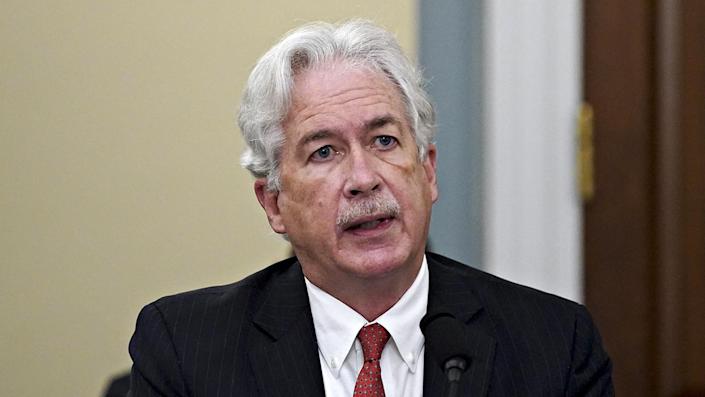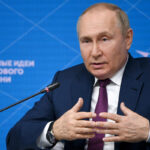CIA Director William Burns suggested that China would carefully study Russia’s many failures in Ukraine, which might inform “how and when” Beijing may invade Taiwan.
“I think our sense is that it probably affects less the question of whether the Chinese leadership might choose some years down the road to use force to control Taiwan, but how and when they would do it,” Burns said at the Aspen Security Forum. “If there’s one lesson I think they may be drawing from Putin’s experience in Ukraine, it’s you don’t achieve quick, decisive victories with overwhelming force.”
Burns provided a wide-ranging interview at the forum, touching on topics ranging from Iran’s nuclear capabilities to the Russian imprisonment of American basketball player Brittney Griner. But he spent most of his time discussing the United States’ two greatest rival nations.
He paid particular attention to Russia’s invasion of Ukraine, including Putin’s mentality and the possible factors that contributed to Russia’s many failures to quickly and decisively win the conflict, and what lessons China might glean from the experience as it looks toward a possible Taiwan invasion.
“I wouldn’t underestimate President Xi’s determination to assert China’s control over Taiwan,” Burns said. “He’s determined to ensure his military has the capability to undertake such an action should he decide to move in that direction.”
The Russian invasion of Ukraine proved a “strategic failure” for Putin, with Burns revealing that he believed the latest U.S. intelligence estimates would indicate around 15,000 Russian troops killed and “maybe three times” as many troops wounded. It was the first update in months from any intelligence source on possible Russian losses.
“The Ukrainians have suffered as well, probably a little less than that, but significant casualties is the big picture,” Burns said, adding that he believed “Russia is planning to dig in and keep hammering Ukraine and believe that when winter comes and the fuel costs are so high on Europe, that NATO solidarity will weaken.”
Putin’s failure to “fracture NATO” would prove his greatest misstep, according to Burns. The alliance will add Finland and Sweden, allowing it to “strengthen its deployments.”
Instead, Russia has now “retreated to a comfortable way of war” with its shift in focus to the Donbas region, instead relying on “long-range firepower” to create a standoff and compensate for weaknesses in manpower.
US ‘SHOULD BE CONCERNED’ BY CHINESE INFLUENCE IN LATIN AMERICA: MILITARY COMMANDER
This may have led China to take a more “cautious” approach to its military after seeing Putin drive Europeans and Americans closer together. It has “unsettled the Chinese … since they banked on their ability to play off some Europeans against the Americans as well,” Burns said.
“The Chinese leadership has been unsettled to some extent — especially in the first days of Putin’s war in Ukraine — by what they saw. Unsettled by the military performance of the Russians early on and the performance of Russian weaponry. Unsettled by the economic uncertainties that the war is unleashed around the world in a year.
“I think Xi Jinping’s main concern is getting through a very important party congress in the autumn and having a relatively predictable global economic landscape.”
Burns also discussed the threat of global warming and said it was a comparable challenge to that of China’s.
“If you assume, as I do, that the People’s Republic of China is the biggest geopolitical challenge that our country faces as far out in the 21st century, as I can see, the biggest existential threat in many ways is climate change,” he said.
The CIA director also repeated warnings of Iran’s increased speed at acquiring a nuclear device, something repeated earlier this month by the French foreign minister.
He noted that under the JCPOA, the Joint Comprehensive Nuclear Agreement, “which the last administration pulled out of several years ago, that breakout time to produce that amount of fissile material was a little more than a year.”
He said today that “same breakout time can be measured not in a year-plus, but in weeks.”
Burns also told the audience at the Aspen Security Forum he had been in Afghanistan the week before the U.S. had withdrawn.
“I’d say, as the president has said publicly, none of us anticipated that the Afghan government was going to flee as quickly as they did or that the Afghan military was going to collapse as fast as it did.
“Having said that, I think CIA at least was always on the more pessimistic end of the spectrum, in terms of highlighting, you know, over the course of the spring and summer, the obvious ways in which the Taliban were advancing rapidly and how this was hollowing out in many ways, not just the political leadership, but also the military.”




